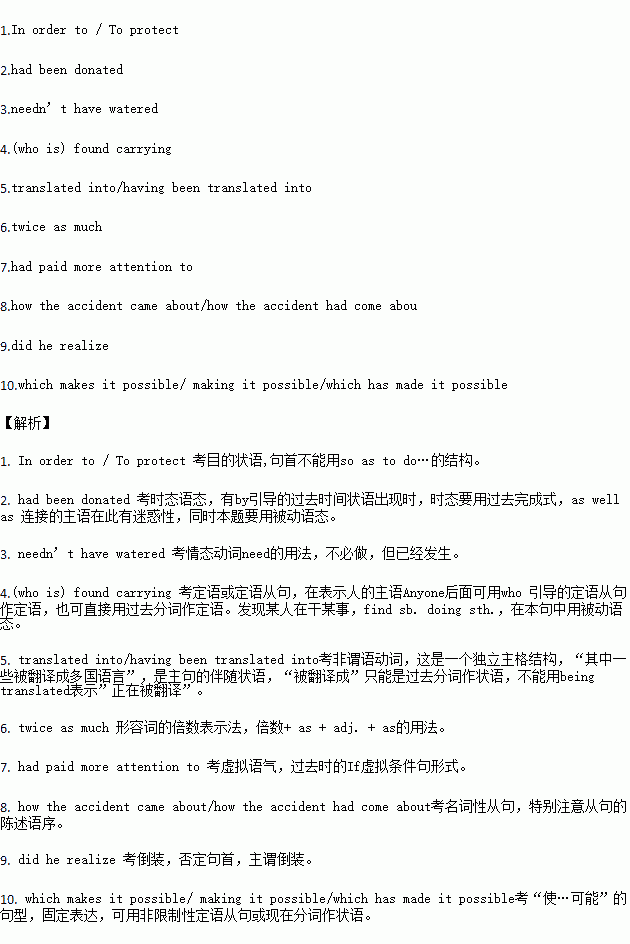题目内容
第一节:完成句子(共10小题;每小题2分,满分20分)
阅读下列各小题,根据汉语提示,用句末括号内的英语单词完成句子,并将答案写在答题卡上的相应题号后。
例:______ was that the young player performed extremely well in the table tennis tournament. (delight) 令球迷欣喜的是那位年轻的球员在乒乓球锦标赛中表现得极为出色。 答案:What delighted the fans/made the fans delighted |
1. ___________________ her daughter from the smog, Chai Jing shuts her daughter at home. (protect)
为了保护女儿不受雾霾的影响,柴静把女儿关在家里。
2.Basic goods, as well as up to RMB¥90,352,800, ___________________ to the Red Cross Society by March 3rd, 2015, in Zhongshan City, where the charity campaign was launched. (donate)
截至2015年3月3日,基本生活物资及多达9035.28万元人民币已捐给中山市的红十字会,该市举办了本次慈善活动。
3.You ___________________ the flowers; the weather forecast says it’s going to rain in the following three days.(water)
你本不必浇花的,天气预报说明天起要连下三天雨。
4. Anyone ___________________ a cellphone in their pocket in the classroom during the examination will be declared cheating.(carry)
任何考试期间在教室被发现携带手机在口袋里的人,都将被宣布为作弊。
5.J. K. Rowling has written a lot of novels, some of them ___________________ several foreign languages. (translate)
J. K. 罗琳写了很多小说,其中一些被翻译成多国语言。
6. Since the new cellphone app of NPC and CPPCC was developed, the delegates have received ___________________ advice as they did last year. (twice)
自从这款新的“两会”手机应用程序开发出来后,与会代表们收到了比去年多一倍的建议。
7.If people ___________________environmental protection while developing economy in the past few decades, China might have a better ecological environment now. (pay)
如果过去几十年人们在发展经济的同时更加关注环保问题,中国现在本可以有一个更好的生态环境。
8.After the air crash, many journalists rushed to the airport to inquire ___________________. (come)
飞机失事后,许多记者赶到机场询问这次意外是怎么发生的。
9.Not until Mr. Green was diagnosed with cancer ___________________ how precious health was. (realize)
直到格林先生被诊断出癌症,他才意识到健康是多么可贵。
10.The issue of fair and equal education has aroused widespread concern, ___________________ for more students from less-developed areas to be enrolled in universities. (make)
教育公平引起了大家的广泛关注,这使得更多来自不发达地区的学生有可能上大学。
 阅读快车系列答案
阅读快车系列答案
